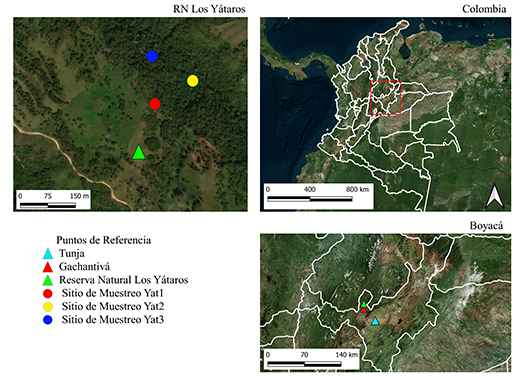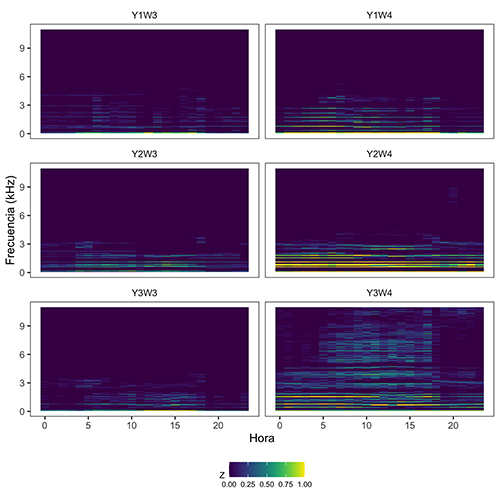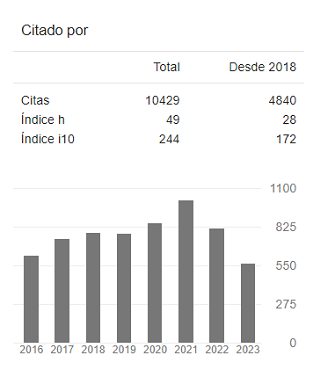Recibido: 30 de mayo de 2020; Aceptado: 9 de noviembre de 2020
Resumen
El monitoreo acústico pasivo es una técnica en la cual se instalan grabadoras con una programación particular de grabación, sin que haya interferencia del observador. A pesar de su reciente interés, muchos lugares en el Neotrópico aún no cuentan con información sobre su actividad acústica. Los eventos de muestreo acústico pasivo de este tipo pueden aportar en un futuro a contestar diferentes preguntas sobre la diversidad acústica del Neotrópico. Presentamos un conjunto de datos de eventos de muestreo acústico pasivo realizados durante el primer semestre de 2020 en la Reserva Natural Los Yátaros, a 6 km de Gachantivá, Boyacá, cordillera Oriental de Colombia. El muestreo consistió en instalar seis grabadoras automáticas AudioMoth, dos en cada sitio de muestreo (n=3). Programamos las AudioMoth para grabar 1 minuto de audio cada 30 minutos a lo largo de todo el día (00:00-23:30) para espectro audible (0 Hz-16 kHz) y en las noches (16:30-06:00) para ultrasonido (hasta 192 kHz). El muestreo se desarrolló desde el 1 de marzo hasta el 2 de mayo del 2020, acumulando en total 12 447 grabaciones, 9055 de espectro audible y 3392 de ultrasonido.
Palabras clave:
Actividad acústica, Andes orientales, Alto Ricaurte, Huella acústica, Paisaje sonoro.Abstract
Passive acoustic monitoring is a technique in which acoustic sensors are placed with a particular recording setting, without interference from the observer. Despite the recent interest, many places in the Neotropics still do not have information on acoustic activity. Such acoustic sampling events would contribute to answer different questions about the acoustic diversity in the Neotropics. We present the dataset of passive acoustic sampling events during the first semester of 2020, at the Natural Reserve Los Yátaros, 6 km away of Gachantivá, Boyacá, Eastern Andes of Colombia. Sampling consisted of installing six AudioMoth acoustic sensors, two at each sampling site (n=3). We programmed all acoustic sensors to record 1 min every 30 minutes throughout the day (00:00-23:30) to audible spectrum (0 Hz-16 kHz), and at night (16:30-06:00) to ultrasound spectrum (up to 192 kHz). The monitoring was conducted from March 1 to May 2, 2020, gathering 12 447 recording, 9055 audible and 3392 ultrasound recordings.
Keywords:
Acoustic activity, Acoustic footprint, Eastern Andes, Ricaurte province, Soundscape.Introducción
Las regiones tropicales son uno de los lugares más biodiversos acústicamente del mundo (Luther & Gentry, 2013), pero aún con vacíos de conocimiento sobre su actividad acústica (Deichmann et al., 2018). Para intentar comprender otras dimensiones de la biodiversidad, recientemente ha surgido el estudio de los paisajes sonoros (Rodríguez-Buriticá et al., 2019). Los paisajes sonoros son la composición de todos los sonidos dentro de un área y momento particular, incluyendo sonidos biológicos producidos por animales (biofonía), sonidos no biológicos ambientales como la lluvia, viento, truenos y cascadas (geofonía), y los sonidos producidos por la actividad humana (antropofonía; Pijanowski et al., 2011). Estudiar el paisaje sonoro ha tomado relativa relevancia en los últimos años, ya que mediante el análisis de los sonidos pueden responderse preguntas sobre patrones de actividad, incluyendo amplias escalas espaciales, y realizando monitoreo de especies específicas para entender la relación de actividad acústica con impacto por actividades humana (Deichmann et al., 2017; Sueur & Farina, 2015; Campos-Cerqueira et al., 2020; Ducrettet et al., 2020).
En los últimos años se han venido realizando cada vez más intensamente estudios sobre la actividad acústica (Farina et al., 2014; Boquimpani-Freitas et al., 2007; Schmidt & Balakrishnan, 2014). Cambios en la actividad vocal debido a factores temporales y ambientales puede proporcionar información sobre la respuesta comportamental referentes a señales acústicas. El clima, por ejemplo, puede influenciar el comportamiento y por ende el repertorio vocal de las especies. La precipitación puede restringir las exhibiciones territoriales (Bas et al., 2008) y alterar la complejidad del repertorio vocal (Medina & Francis, 2012). En anuros, largas temporadas de lluvia puede alterar la actividad acústica, como también influenciar cambios poblacionales (Stewart, 1995), y en otros casos, la precipitación da lugar a estanques efímeros donde se reúnen múltiples especies de anuros para vocalizar (Ulloa et al., 2019). Los niveles de luz ambiental también han demostrado tener un efecto en la reproducción, forrajeo e interacciones entre depredador-presa para especies nocturnas de aves (Kronfeld-Schor et al., 2013). En anuros, efectos de la luz ambiental han sido relacionados con el comportamiento durante las temporadas de reproducción (Vignoli & Luiselli, 2013; Onorati & Vignoli, 2017) y muy poco se ha estudiado en referencia a la actividad acústica (Fitzgerald & Bider, 1974).
El monitoreo acústico tradicional se enfoca en la observación directa del organismo vocalmente activo (Parker, 1991), mientras el monitoreo acústico pasivo utiliza grabadoras colocadas en un área de estudio para grabar vocalizaciones y luego detectar la presencia de los individuos (Blumstein et al., 2011). Los métodos acústicos ofrecen una forma eficiente para obtener de forma autónoma grandes cantidades de información, continua, simultánea y de registros permanentes que reflejan la actividad acústica que pueden ser utilizada nuevamente para responder diferentes preguntas o complementar diferentes metodologías (Boquimpani-Freitas et al., 2007; Aide et al., 2013; Laverde et al., 2017). El objetivo de presentar un conjunto de datos de eventos de muestreo acústico es dejar disponible la información primaria levantada en el campo (archivos de audio), en este caso para una reserva privada del municipio de Gachantivá. Los archivos de audio serán usados para investigar cómo está compuesta la huella acústica de la reserva en los tres puntos de muestreo a lo largo de nueve semanas, lo cual puede luego contrastarse con factores ambientales (precipitación, luz ambiental) que ayuden a explicar cambios en la estructura acústica.
Datos del Proyecto
Título: Conjunto de datos de monitoreo acústico pasivo en la Reserva Natural Los Yátaros de Gachantivá, Boyacá, Colombia.
Personas asociadas: Juan Diego Tovar García
Fuentes de financiación: Fuentes propias.
Descripción del área de estudio
Los datos fueron recolectados en el noreste de los Andes colombianos, en la Reserva Natural Los Yátaros, vereda La Caja, del municipio de Gachantivá, departamento de Boyacá. La reserva está compuesta por robledales y bosque sub andino en diferentes estadios de regeneración natural. El muestreo fue desarrollado desde el 1 de marzo hasta el 2 de mayo del 2020, lo cual incluye 9 semanas de grabación.
Descripción del proyecto:
El proyecto buscó tener un conjunto de datos de los sonidos en espectro audible y en ultrasonido de los componentes de la huella acústica de la reserva. Para esto, escogimos tres puntos en el sendero principal, separando cada punto de muestreo por más de 150 m. En cada punto instalamos dos grabadoras AudioMoth a diferente tasa de muestreo, posicionadas a alturas diferentes. Las grabaciones fueron ingresadas a la Colección de Sonidos Ambientales y esperan ser analizadas durante los próximos meses.
Cobertura geográfica
Descripción.
En la Reserva Natural Los Yátaros. Departamento de Boyacá, Municipio de Gachantivá, Vereda La Caja (Figura 1).
Figura 1: Área de muestreo detallando cada uno de los tres sitios de muestreo en donde se colocaron las grabadoras Audio- Moth en la Reserva Natural Los Yátaros, Boyacá, Colombia. Yátaros, Boyacá, Colombia.
Coordenadas: 5°47’25.6” N, 73°33’24” O y 5°47’21.3” N, 73°33’ 1.6” O.
Cobertura temporal: 01 de marzo de 2020-02 de mayo de 2020
Datos de la colección
Nombre de la colección: Colección de Sonidos Ambientales del Instituto de Investigación de Recursos Biológicos Alexander von Humboldt.
Identificador de la colección: IAvH-CSA, Registro Nacional de Colecciones 3
Identificador de la colección parental: IAvH
Método de preservación de los audios: Archivos digitales en formato WAV
Materiales y Métodos
Área de estudio
Los datos fueron recolectados en el noreste de los Andes colombianos en la Reserva Natural Los Yátaros, vereda La Caja, del municipio de Gachantivá, departamento de Boyacá (Figura 1). La reserva queda a 6 km del casco urbano de Gachantivá, y está compuesta por robledales y bosque subandino en diferentes estadios de regeneración natural secundaria. El muestreo se desarrolló desde el 1 de marzo hasta el 2 de mayo del 2020, lo cual incluye nueve semanas de grabación.
Descripción del muestreo
Realizamos nueve semanas de grabación en tres puntos a lo largo del camino principal de la reserva, usando grabadoras autónomas AudioMoth, grabando todos los sonidos presentes (biofonía, geofonía y antropofonía). Instalamos dos grabadoras AudioMoth por cada sitio de muestreo (n=3) a lo largo del camino principal dentro de la reserva (Figura 1). Cada punto de muestreo estuvo separado por mas de 150 m de los otros, para evitar pseudorréplicas y asumiendo una independencia entre los puntos. La programación de las grabadoras fue de 1 minuto de grabación cada 30 minutos durante todo el día (00:00-23:30) para un set de grabadoras (3) a una tasa de muestreo de 32 kHz, y 1 minuto de grabación cada 30 minutos durante la noche para otro set de grabadoras (3) a 384 kHz, todas en formato de audio no comprimido (wav) y con una ganancia alta. Las grabadoras de espectro audible (32 kHz) las instalamos a 1.5 m del suelo, mientras que las de ultrafrecuencia (384 kHz), a 2.5 m del suelo. El esfuerzo de muestreo fue de nueve semanas, del 1 de marzo al 02 de mayo del 2020.
Control de calidad. Previo a la programación de las grabadoras AudioMoth, realizamos pruebas dentro de las instalaciones de la Colección de Sonidos Ambientales en la sede Villa de Leyva del Instituto Humboldt, seleccionando aquellas grabadoras que tuvieran un buen estado general, con el interruptor on/off completo, y que no tuvieran partes oxidadas. Realizamos una prueba de grabación para verificar el correcto funcionamiento. Aleatoriamente, algunas grabaciones de espectro audible y de ultrasonido fueron seleccionadas para confirmar su estado. Los datos fueron corroborados por la Infraestructura Institucional del Instituto Humboldt (I2D).
Descripción de la metodología paso a paso.
Programación para la toma de los datos acústico: Usamos el programa “AudioMothTime” para ajustar cada grabadora en UTC-5, correspondiente a la hora local colombiana, confirmando que la hora y la fecha estuvieran correctas. Con el programa “AudioMothConfig” configuramos los periodos de grabación y programación de encendido y apagado de la grabadora.
Frecuencia de grabación: Programamos grabar 1 minuto por cada 30 minutos a lo largo de todo el día (00:00-23:30) para espectro audible y 1 minuto por cada 30 minutos en la noche (16:30-06:00) para ultrasonido.
Ajuste de las AudioMoth - espectro audible: Tasa de muestreo: 32 kHz; ganancia: alta; duración de pausa o no grabación: 1760 segundos; duración de grabación: 60 segundos.
Ajuste de las AudioMoth - ultrasonido: Tasa de muestreo: 384 kHz; ganancia: alta; duración pausa o no grabación: 1760 segundos; duración de grabación: 60 segundos.
Altura de las AudioMoth: Las grabadoras programadas en espectro audible fueron instaladas a 1.5 metros de altura en referencia al suelo, mientras que las grabadoras programadas para ultrasonido a 2.5 metros de altura.
Una vez montadas el par de grabadoras por punto de muestreo, registramos metadatos como: coordenadas, elevación (m. s.n.m) y nombre del punto de muestreo.
Las grabaciones en espectro audible están siendo subidas a la plataforma de análisis acústico ARBIMON, para generar representaciones gráficas de la huella acústica por semana por sitio (Deichmann et al., 2017).
Resultados
Reportamos 12 447 registros de audio proveniente de muestreo pasivo con sensores acústicos de la Reserva Natural Los Yátaros en Gachantivá, Boyacá, Colombia (Tabla 1). El conjunto de datos puede ser accedido en el IPT del Instituto Humboldt, el cual se replica en los portales SiB Colombia y GBIF. Para acceder a los datos y al URL único de cada evento de muestreo acústico pasivo se debe descargar el archivo DarwinCore (DwC-A), lo cual genera una carpeta en las descargas con varios archivos *.txt que se vinculan con la columna “id”; de particular interés los archivos “event.txt” y “multimedia.txt” permiten acceder a los datos crudos de cada evento de muestreo y al enlace de acceso al audio. Recomendamos abrirlos con un editor de texto, copiar y pegar en Excel utilizando la herramienta de pegado de texto “Wizard” para definir el separador de columnas. Nuestro fin último es que estos eventos acústicos, con sus datos relacionados, puedan ser dispuestos en una plataforma nacional de acceso y análisis específica para este tipo de información en un futuro cercano.
Tabla 1: Número de grabaciones obtenidas por cada uno de los sitios de muestreo
Sitio
Latitud
Longitud
Elevación (m)
Frecuencia Acústica
# de Grabaciones
Yat1
5.78926
-73.55044
2300-2325
0 Hz-24 kHz
3019
5.78926
-73.55044
2300-2325
0 kHz-192 kHz
996
Yat2
5.78938
-73.54900
2300-2325
0 Hz-24 kHz
3018
5.78938
-73.54900
2300-2325
0 kHz-192 kHz
968
Yat3
5.79044
-73.54983
2300-2325
0 Hz-24 kHz
3018
5.79044
-73.54983
2300-2325
0 kHz-192 kHz
1428
Descripción del conjunto de datos
URL del recurso. Para acceder a la última versión del conjunto de datos.
IPT.https://doi.org/10.15472/wt0elp
Portal SiB Colombia.https://datos.biodiversidad.co/dataset/8f77f7e5-139f-46ef-a84b-ed9020168dea
Portal GBIF.https://www.gbif.org/dataset/ 8f77f7e5-139f-46ef-a84b-ed9020168dea
Nombre. Conjunto de datos de monitoreo acústico pasivo en la Reserva Natural Los Yátaros de Gachantivá, Boyacá, Colombia.
Idioma. Español
Codificación de caracteres. UTF-8
URL del archivo. Para acceder a la versión del conjunto de datos descrita en este artículo:
IPT.https://ipt.biodiversidad.co/biota/resource? r=map_yataros_2020
Formato del archivo. Darwin Core Archive
Fecha de publicación de los datos. 2020-05-18
Idioma de los metadatos. Español
Licencia de uso.Creative Commons Attribution Non Commercial (CC-BY-NC) 4.0 License.
Discusión
Este es un artículo de datos pionero sobre eventos pasivos de muestreo acústico para un sitio en particular. La publicación de otros artículos de datos sobre sonidos del departamento de Boyacá han incluido grabaciones direccionales mantenidas en repositorios particulares (Buitrago-Cardona et al., 2020). Con la inclusión de muestreo pasivo para monitorear los paisajes sonoros se puede evaluar el estado en el que se encuentra un ecosistema haciendo uso de la actividad acústica (Pijanowski et al., 2011; Deichmann et al., 2017). Aunque monitorear la respuesta de diferentes taxones de animales simultáneamente es aún un reto, con la ayuda de nuevas herramientas emergentes (e.g., ARBIMON II, paquetes en R o Python), la detección e identificación de los individuos vocalmente activos se espera que sea cada vez más fácil (Deichmann et al., 2018; Ducrettet et al., 2020).
En nuestra área de estudio, este conjunto de datos puede ayudar a crear una representación visual de los paisajes sonoros, lo cual puede resaltar las horas del día más activas vocalmente como picos de actividad. Estos picos de actividad en algunos datos bajo actual análisis muestran un coro durante la mañana, en el que la mayoría de las vocalizaciones fueron producidas por aves, y otro coro en el atardecer, en el que hubo presencia acústica de aves, anfibios e insectos. Los insectos hacen una proporción substancial en el paisaje sonoro, mostrando picos de actividad a lo largo de toda la noche, y solapándose con el coro de amanecer y atardecer. Hasta el momento, tres especies diferentes de anuros han sido identificados en las grabaciones, los cuales servirán para futuros análisis de la actividad acústica de este grupo en la reserva. De igual modo, es evidente la influencia diferencial que ejerce sobre el paisaje sonoro el cambio de lluvias de una semana a otra (Figura 2), lo cual puede influenciar la actividad acústica dentro de la reserva (Ulloa et al., 2019). El actual monitoreo acústico espera ser continuado para abordar preguntas a escala temporal anual dentro del área de estudio.
Figura 2: Representación tridimensional del paisaje sonoro para dos semanas (W3, W4) en tres sitios (Y1, Y2, Y3) en la Reserva Natural Los Yátaros, Boyacá, Colombia. Eje horizontal (X) representa la hora del día, eje vertical (Y) representa la frecuencia acústica (en subconjunto de 0-10 kHz) y los colores (Z) representa la proporción de grabaciones con un pico de amplitud mayor a 0.06.























